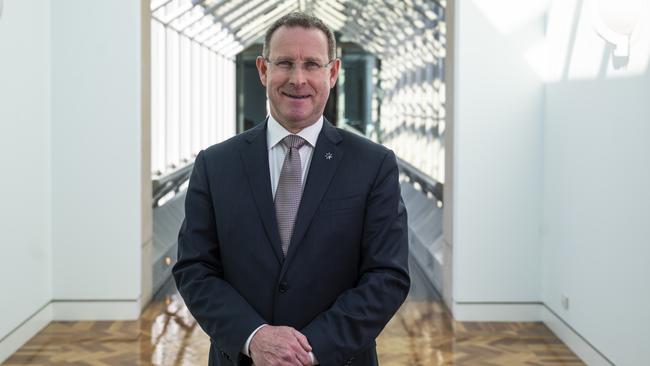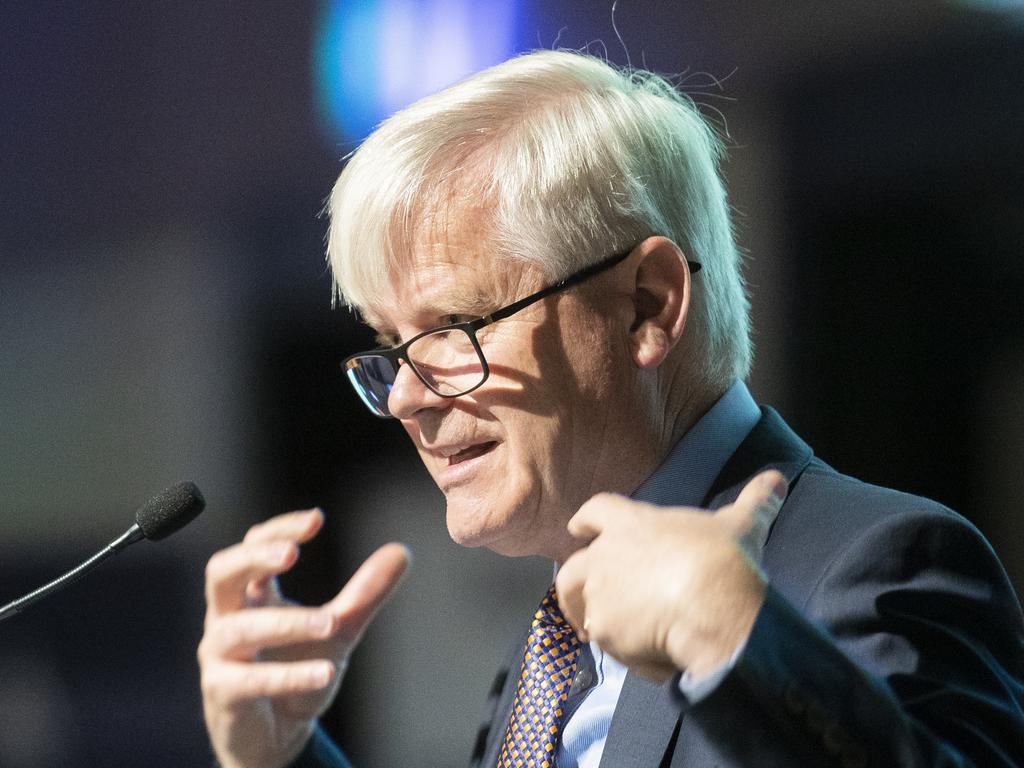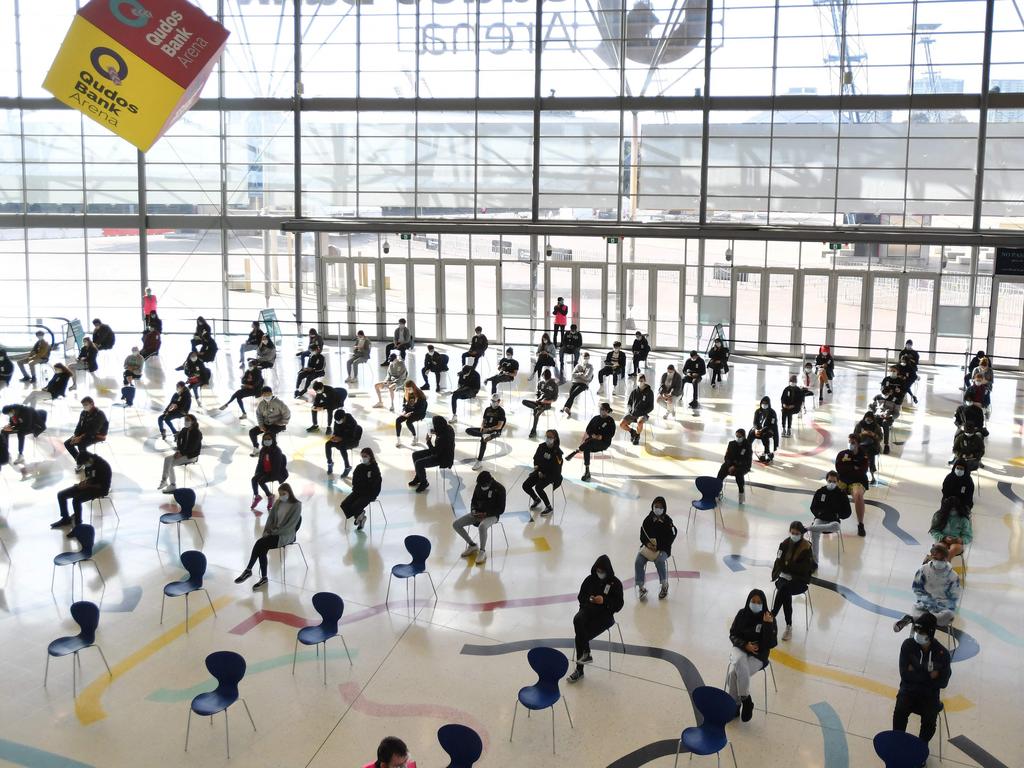‘Now’s the time to plan for open borders,’ says ACCI chief Andrew McKellar
The ACCI’s new chief Andrew McKellar has warned that Australia is in danger of ‘resting on its laurels’ in its handling of Covid.

The Australian Chamber of Commerce and Industry’s new chief executive Andrew McKellar has warned that Australia is in danger of “resting on its laurels” in its handling of Covid, calling for better planning for government quarantine hotels, vaccine booster shots and other measures to “get ahead of the curve”.
Even as NSW and Victoria this week tightened rules in their respective lockdowns in response to rising case numbers, Mr McKellar said the federal government urgently needed a plan to open up Australia to the world.
He said it was important to allow Australians to come home more easily as well as bringing in skilled workers and students.
“We have been living in a gilded cage for the last 12 months and I am not sure we are realistically planning the way out of it,” he said in his first major interview since taking over as CEO of the business group this week.
“We don’t want to still be doing lockdowns in five or six months time, or even in one or two months if we can avoid it.
“Reopening Australia to the world is the No.1 priority. This has to be solved as soon as possible.
“Business wants to do everything it can to get us further along that pathway.”
McKellar returned to Australia in January after six years in Paris as secretary-general for automobile mobility and tourism at the Federation Internationale de l’Automobile (FIA), the governing body of world motorsport and the leading network for touring organisations.
He is speaking about Covid with first-hand experience – he caught the virus while in Paris early last year and it took him some weeks to recover.
“We were in lockdown. It was before there was mass testing,” he said.
It was a time when people did everything they could to avoid going to hospital. He initially denied that he was sick but eventually realised he had caught the virus. “I was struggling to get better for four weeks,” he said.
Luckily, his family did not catch the virus.
“It presents very differently for a lot of people,” he said. “In some families, everyone gets it, in others only one person gets it.
“There is no rhyme or reason. It was a very tough period living through that time in Europe.”
Mr McKellar takes charge of the ACCI as the Australian economy is poised to slip back into recession as lockdowns sap business and consumer confidence.
The ACCI represents state and territory chambers of commerce as well as more than 80 industry associations, covering companies with more than four million workers.
He said Australia had done well initially in handling Covid but there was a concern that not enough planning was being done to cope with Covid as a long-term issue.
“Australia has been very fortunate to largely have been shielded, or managed to shield itself, from the worst impacts of the pandemic,” he said.
“Living in France during that period, you saw the very damaging impact it had on public health and economic outcomes.
“In France (which has a population of 67 million) we were regularly seeing 30,000 cases a day. and, at the peak of the crisis last year, we were seeing 50,000 to 60,000 a day.”
He said Australia had been fortunate to be able to suppress Covid until the recent outbreak of the Delta variant.
“But as we open up, as we move forward, Covid will come in and we have to learn to live with it,” he said.
It was “not realistically achievable” for Australia to get back to zero cases in the foreseeable future.
“We have got to have a very clear plan to move past this psychology of zero Covid,” he said.
While state governments were battling to cope with the outbreak of the Delta variant, more work needed to be done planning for the future.
“There is not enough parallel work being done to ensure we are getting ahead of the curve and staying ahead of the curve,” he said.
“We have been living in a gilded cage for the past 12 months and I am not convinced that we are realistically planning our way out of it.”
The federal government’s goal of having 70 per cent vaccination before it began to open borders was not realistic.
“Either we are not going to meet the preconditions to get things reopening for a long time, or we are going to have to change the plan,” he said.
Targets of 70 to 80 per cent vaccinations before borders could be reopened were too high and above the levels achieved in many other countries.
“Those targets are incredibly difficult to reach,” he said.
“Yet other major countries including the US and the UK are opening their economies up much more than we are.
“In most cases their levels of vaccinations are nowhere near those levels.”
McKellar said much more work should be done on organising a better system of quarantine hotels.
“Quarantine is a federal government responsibility,” he said.
“We have had more than 12 months to move past the current interim solution.”
He said it was important Australia now had dedicated quarantine facilities capable of handling more people coming into the country “including Australians who want to come back, as well as people with essential or important skills”.
Business leaders met with the government some weeks ago and argued that task forces needed to be established to look at longer-term plans for reopening.
Mr McKellar said his family had a traumatic time trying to get back to Australia earlier this year.
He had been able to get on a flight in January but his wife and children had to through eight weeks of uncertainty, including cancelled flights and lack of information on whether they would be allowed to board flights they had booked.
“It was extremely difficult,” he said.
“We couldn’t understand why it was made to be so hard.
“We felt utterly abandoned. There was very little information we could get from the embassy or Australian authorities.
“You had sense a sense of being abandoned, and left out there, swinging in the breeze, with no one interested in trying to help you to get home at all.”
He said the system of hotel quarantine, where some people could be kept in rooms with no fresh air and no laundry or kitchen facilities (as he had to do in Adelaide) was not a viable solution.
“I don’t think hotel quarantine is the way to go. At best it is a temporary solution. We are not out of this (the virus).
“There will be a demand for this (quarantine-standard accommodation) for a long period of time to come.”
Mr McKellar said vaccines would become part of life.
“We need to get vaccinated and keep getting vaccinated with booster shots.
“It’s going to be part of our future.”








To join the conversation, please log in. Don't have an account? Register
Join the conversation, you are commenting as Logout